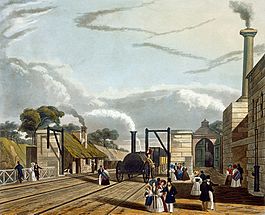Parkside railway station (Newton-le-Willows)
| Parkside | |
|---|---|

Taking in Water at Parkside, from Bury's Liverpool and Manchester Railway, 1831
|
|
| Location | |
| Place | Lowton |
| Area | Wigan |
| Coordinates | 53°27′22″N 2°35′22″W / 53.456°N 2.5895°WCoordinates: 53°27′22″N 2°35′22″W / 53.456°N 2.5895°W |
| Grid reference | SJ609956 |
| Operations | |
| Original company | Liverpool and Manchester Railway |
| Pre-grouping | London and North Western Railway |
| Post-grouping | London, Midland and Scottish Railway |
| Platforms | 2 |
| History | |
| 15 September 1830 | Station opened |
| 1839 | Station closed to passengers |
| 1839 | Replacement station opened to the east |
| 1 May 1878 | Station closed completely |
| Disused railway stations in the United Kingdom | |
| Closed railway stations in Britain A B C D–F G H–J K–L M–O P–R S T–V W–Z |
|
|
|
|
Parkside railway station was an original station on the Liverpool and Manchester Railway. It was sometimes referred to in contemporary accounts as "Kenyon".
The station opened with the line on 15 September 1830. It was originally designed as a halt for early locomotives to take on water about halfway along the new line, a process which was recorded in 1830 as taking about seven minutes. From an early date the water was pre-heated by a lineside boiler. The boiler's chimney can be seen to the right of the print reproduced here. During the opening ceremony the MP William Huskisson was killed in an accident at the station.
In 1839, the station was relocated approximately 24 chains (480 m) east, to accommodate the new line to Preston. The old station remained open for a period as a goods halt, being labelled a "Luggage Station" on the 1849 OS map. The new station closed on 1 May 1878, as the newer locomotives did not need to take on water so frequently. One source states "The watering point was not a station."
Both stations are long-demolished, but the Huskisson Memorial remains at the original site near Newton-le-Willows. The modern boundary between the Boroughs of St Helens and Wigan runs through the second station site, the first station site is within St Helens.
...
Wikipedia
